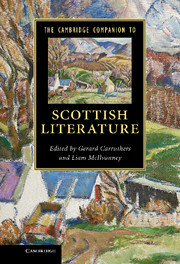Book contents
- Frontmatter
- Contents
- Notes on Contributors
- Acknowledgements
- Chronology
- Introduction
- 1 Scottish Literature before Scottish Literature
- 2 The Medieval Period
- 3 Reformation and Renaissance
- 4 The Aftermath of Union
- 5 Robert Burns
- 6 Enlightenment, Romanticism and the Scottish Canon
- 7 Scott and the Historical Novel
- 8 The Gaelic Tradition
- 9 Scottish Gothic
- 10 Victorian Scottish Literature
- 11 Robert Louis Stevenson
- 12 Hugh MacDiarmid and the Scottish Renaissance
- 13 Popular Fiction
- 14 Muriel Spark
- 15 The Glasgow Novel
- 16 ‘What is the language using us for?’
- 17 The Emergence of Scottish Studies
- 18 Otherworlds
- 19 Scottish Literature in Diaspora
- Index
- References
12 - Hugh MacDiarmid and the Scottish Renaissance
Published online by Cambridge University Press: 05 January 2013
- Frontmatter
- Contents
- Notes on Contributors
- Acknowledgements
- Chronology
- Introduction
- 1 Scottish Literature before Scottish Literature
- 2 The Medieval Period
- 3 Reformation and Renaissance
- 4 The Aftermath of Union
- 5 Robert Burns
- 6 Enlightenment, Romanticism and the Scottish Canon
- 7 Scott and the Historical Novel
- 8 The Gaelic Tradition
- 9 Scottish Gothic
- 10 Victorian Scottish Literature
- 11 Robert Louis Stevenson
- 12 Hugh MacDiarmid and the Scottish Renaissance
- 13 Popular Fiction
- 14 Muriel Spark
- 15 The Glasgow Novel
- 16 ‘What is the language using us for?’
- 17 The Emergence of Scottish Studies
- 18 Otherworlds
- 19 Scottish Literature in Diaspora
- Index
- References
Summary
Though commonly viewed as definitively rural and nationalist, the Scottish Literary Renaissance was actually begun in London by an émigré community of Burnsian Scots. The Vernacular Circle of the London Robert Burns Club, set up in 1920 to save the Doric from oblivion, boasted John Buchan and Violet Jacob as honorary members. Christopher Murray Grieve (‘Hugh MacDiarmid’) was an initial sceptic, objecting in formalist tones that ‘Mere patriotism is a Caliban’s Guide to letters.’ In the early 1920s, Grieve thought any revival of the Scots vernacular could only invite cultural inferiorism and further marginalisation and was glad to be one of the movement’s ‘most indefatigably helpful enemies’. Grieve disliked what he perceived as the Kailyard inflection in the Scots poems of Charles Murray (1864–1941), whose Hamewith (1900; 1909) was enormously popular, particularly in Murray’s native north-east. Born in Alford, Aberdeenshire, Murray emigrated to South Africa in 1888 to manage a gold-mining company, rising to be Secretary of Public Works in the Transvaal. Murray’s Doric poems are often infused with an exilic sentimentality for ‘Scotland our Mither’. Character sketches of rural Aberdeenshire life, such as ‘The Whistle’ and ‘Dockens Afore His Peers’, link him tonally to William Alexander’s Johnny Gibb of Gushetneuk (1871), but also to Lewis Grassic Gibbon’s Sunset Song (1932). Grieve included Murray in his journal Northern Numbers (1920–2) but later turned on him, along with other established figures such as J. M. Barrie and Neil Munro, in the Scottish Educational Journal, accusing Murray and the Doric revival of exemplifying ‘mental parochialism, a constitutional incomprehension and hatred of culture’.
- Type
- Chapter
- Information
- The Cambridge Companion to Scottish Literature , pp. 173 - 187Publisher: Cambridge University PressPrint publication year: 2012
References
- 13
- Cited by



